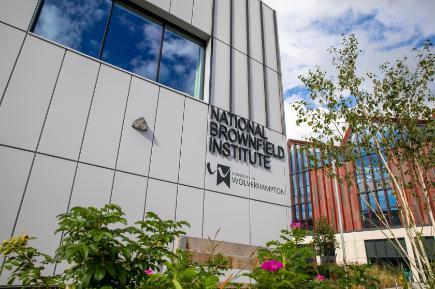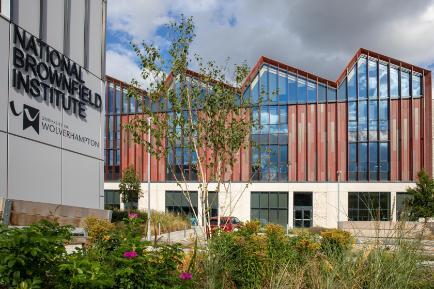The National Brownfield Institute (NBI) is a world-class centre that will be integral to the way land remediation and regeneration is carried out across the Black Country, West Midlands, the UK and beyond and will play a pivotal part in unlocking industrial land to help tackle the housing shortage in towns and cities. The institute is one of the projects supported by the Government’s Getting Building fund for the West Midlands, part of the Levelling Up programme, in partnership with City of Wolverhampton Council, the Black Country LEP and West Midlands Combined Authority (WMCA).
The NBI focuses on the practical application of future brownfield regeneration through the work of research teams; and leads policy development, research and innovation, and commercial services for brownfield regeneration. The institute will help attract investment into housing and drive housing supply by accelerating development of brownfield sites, which in the past have frequently been seen as too expensive and complicated to warrant redevelopment.

The NBI houses some of the latest facilities to support business engaged in brownfield regeneration. The physical laboratories provide the ability to undertake testing of soil samples, water and site conditions. It also houses state-of-the-art technology including immersive visualisation suite, Spot- the agile, mobile robot dog, designed by Boston Dynamics as well as the latest wearable and hand-held laser scanning devices in supporting brownfield regeneration ensuring that stakeholders make the right decisions by using a wide range of digital data.

The NBI’s vision is to “Create a world-class brownfield regeneration industry cluster through multi-sector partnership, based at the University of Wolverhampton’s Springfield site.” Situated on the University of Wolverhampton’s flagship £120 million Springfield Campus, it provides the facility to develop advanced skills, technologies and methodologies through innovation and partnership with the construction industry. The Institute will complement the vision for Springfield as a hub for excellence in construction and the built environment on both a national and international scale. It will also help securing the City of Wolverhampton's position as a leader internationally in sustainable construction and brownfield development and will deliver new skills, jobs and opportunities for local people in the city and beyond, which has been hit hard by the pandemic.
The NBI will be a catalyst in transforming “wasted spaces to living places”.
WEST MIDLANDS COMBINED AUTHORITY (WMCA) GETTING BUILDING FUND
The Government is making £900 million available through the new Getting Building Fund (GBF) for investment in local, shovel-ready infrastructure projects to stimulate jobs and support economic recovery across the country. West Midlands Combined Authority (WMCA) has been allocated £66m from the GBF for a wide-ranging package of projects that will deliver a much-needed boost to the local economy.

The WMCA Getting Building Fund includes an allocation spread across the seven constituent authorities, for projects led by the WMCA working with the three LEPs; Black Country LEP, Coventry and Warwickshire LEP (for Coventry1) and Greater Birmingham and Solihull LEP.

The funding would primarily enable:
Town and city centre modernisation through targeted infrastructure investments unleashing their longer-term economic potential.
Investment in physical connectivity to improve the functioning of the local economy.
Investment in innovation ecosystem including through improvements to research and development facilities driving up business productivity.
Improvements to human capital.
Improving digital connectivity, to support economic performance, particularly in more isolated areas.


/prod01/wlvacuk/media/departments/digital-content-and-communications/images-18-19/iStock-163641275.jpg)
/prod01/wlvacuk/media/departments/digital-content-and-communications/images-2024/250630-SciFest-1-group-photo-resized-800x450.png)
/prod01/wlvacuk/media/departments/digital-content-and-communications/images-18-19/210818-Iza-and-Mattia-Resized.jpg)
/prod01/wlvacuk/media/departments/digital-content-and-communications/images/Maria-Serria-(teaser-image).jpg)
/prod01/wlvacuk/media/departments/digital-content-and-communications/images-2024/241014-Cyber4ME-Project-Resized.jpg)
/prod01/wlvacuk/media/departments/digital-content-and-communications/images-18-19/210705-bric_LAND_ATTIC_v2_resized.jpg)